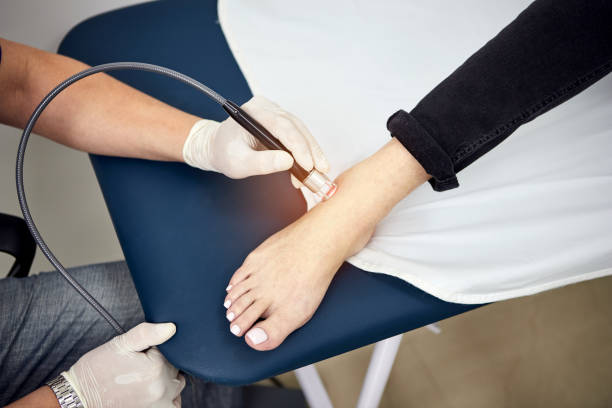Foot and ankle pain should never be ignored, even if it can be managed with over-the-counter treatments. Issues like calluses and corns can lead to more serious conditions if left untreated.
A podiatrist will take a detailed medical history and conduct a physical exam to identify the cause of your pain. They may also order imaging tests such as X-rays or an MRI to help with diagnosis.

1. Pain
If your foot or ankle hurts consistently, it’s a good idea to see a local podiatrists. The doctor can take a look at your ankle and foot to determine what is causing the pain, then recommend treatment options such as ice application, rest, physical therapy, custom orthotics or surgery depending on the condition.
Any sudden swelling or numbness in your feet or ankles should be addressed right away. This could be a sign of a more serious problem, like Morton’s neuroma, which is a nerve issue between the third and fourth toe bones that can cause pain, burning, or a feeling that there’s something stuck in your shoe.
Any lumps or bumps on your feet are also worth checking out with a podiatrist. They may be a cyst or tumor that requires surgery, or they could be a sign of arthritis. Bunions, which are a bony bump on the outside of your big toe joint, can be painful and interfere with normal walking when they get too large. A podiatrist can prescribe anything from padding to surgery to treat a bunion.
2. Bruising
If you’re finding that you have a lot of calluses, corns or blisters, they may need attention from a podiatrist. They can help remove the areas of thickened skin that cause pain and recommend a topical treatment. They also have the ability to properly “break in” new shoes so that you don’t get any pain, blisters or injuries. If you have a bunion, the bony bump that develops on the outside of your big toe joint, they can help you by taking an x-ray and recommend treatment options based on its size and severity.
Unexplained bruising can be a sign of abuse or domestic violence. If you or a loved one are experiencing this, it’s important to make an appointment with your doctor right away. They may be able to identify the underlying cause of the problem, like blood platelet levels or an autoimmune disease. They can also give you tips for reducing the chance of bruising, such as by removing hazards around the home like clutter or electrical cords. They may also suggest getting regular x-rays to identify problems early.

3. Soreness
Foot pain can be a symptom of a variety of different conditions, from a simple bruise to a severe fracture. If you notice a persistent soreness, especially if it doesn’t go away with rest or over-the-counter medication, it may be time to schedule an appointment with a podiatrist website.
Swelling in your feet is another sign it’s time to see a podiatrist. Swelling can indicate an injury, infection, or an underlying health issue like heart disease or diabetes. Numbness or a sensation of ‘pins and needles’ in your feet is also something to be concerned about. It could be a sign of nerve damage, which is often associated with diabetes and neuropathy.
Changes in your nail color and shape should also be considered a reason to see a podiatrist. Nails that are discolored, brittle, thickened or wavy can be an indication of a fungal infection or other health issues. Thick calluses or corns are often due to improper footwear, but a podiatrist can help you find the best treatment for these conditions.
4. Changes in Your Gait
If you notice that your feet aren’t as stable and comfortable as they used to be, it’s time to see a podiatrist. A podiatrist can help you improve the condition of your foot and ankle so that it doesn’t worsen over time.
Furthermore, if you’ve been experiencing heel pain while standing or walking, it could indicate plantar fasciitis, a prevalent condition that can be effectively managed with appropriate treatment. If you’re unsure where to seek treatment, consider searching online for “plantar fasciitis treatment near me” Keep in mind that heel pain may also be symptomatic of arthritis, underscoring the importance of consulting a podiatrist to receive comprehensive care tailored to your needs.
Other signs that it’s time to visit a podiatrist include unexplained swelling or numbness in the feet or ankles. Swelling that doesn’t go away may indicate an infection, blood clot, or heart/circulation problems. Podiatrists have extensive training in the foot and ankle and can help you treat these conditions. If you have these symptoms, ask your family doctor for a referral to see a podiatrist. You’ll be glad you did! The letters “DPM” after a doctor’s name mean that he or she has completed rigorous podiatric medical school and hospital-based residency training, making them uniquely qualified to treat the feet and ankles.
5. Changes in Your Footwear
A podiatrist is a physician who specializes in foot, ankle and related problems. He or she focuses on these areas because the feet are the foundation of your body, supporting your weight and providing you with the mobility you need to perform daily activities without any discomfort.
As such, any changes in your foot or ankle that don’t go away may indicate a condition that requires professional attention. For instance, if you’re experiencing persistent pain, numbness or swelling in your foot and ankle, it’s time to visit a NYC podiatrist.
Also, it’s a good idea to visit a podiatrist if you’ve recently started a new exercise routine and are having trouble performing the activity or are getting blisters or other injuries. Your podiatrist can provide you with proper shoe recommendations and orthotics to help reduce these issues. Also, he or she can offer advice on breaking in new shoes to prevent injury and discomfort.




